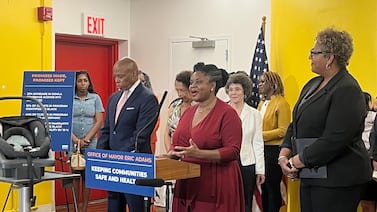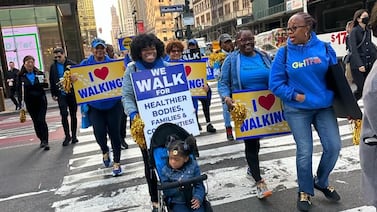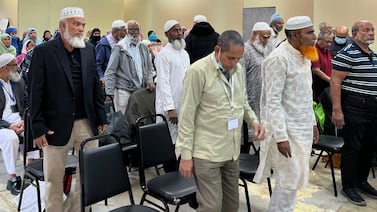Public health, explained: Sign up to receive Healthbeat’s free Atlanta newsletter here.
In the wake of Donald Trump’s presidential re-election, metro Atlantans who work with the U.S. State Department’s refugee resettlement program don’t know which parts of the president-elect’s campaign rhetoric will translate into his immigration policy.
But with the prospect of funding cuts, unexpected obstacles, and attempts to undermine the United States’ obligation to people in danger looming, public health organizations that help refugees are focused on finding ways to sustain their support throughout the coming years.
In his first term, Trump’s administration severely limited the number of refugees admitted to the United States compared to prior decades. Over the past year on the campaign trail, Trump frequently demonized people who have recently come to America, going as far as to say they were “poisoning the blood of our country.”
Refugee services provide jobs, mental health support
Steph Solvig is the community engagement and partnership coordinator of Refuge Coffee Company, an organization focused on job training for resettled refugees in Clarkston, Georgia. Among other goals, the shop aims to create career opportunities for immigrants that are safer than jobs like poultry factory work.
Nearly half of Clarkston’s residents are immigrants, many of them arriving through the federal resettlement program. Solvig worries Trump’s words could be a harbinger of even more aggressive restrictions to the Department of State’s efforts to help people across the globe escape dangerous situations.
And with Republicans possibly holding majorities in the Senate and the House, she fears cuts to the program could have profound effects on the health of refugees and the ability of workers to serve newcomers.
“The entire resettlement program is at stake,” she said.
Other Atlantans who work to provide services to refugees are also concerned — not just about people looking to come to the United States, but also those who are already here who need support, like mental health services.
Justin Howell, executive director of the Georgia and Florida International Rescue Committee offices, said he wants to wait and see what policies are proposed before reacting to Trump’s rhetoric. But his agency is prepared to pivot toward helping resettled refugees in new ways, like attending to various health issues that many newcomers face. His biggest concern is that new politics could further prevent people across the world fleeing oppression and persecution from getting the safe havens and resources they need.
“This country could turn away from what we could be doing in terms of meeting our humanitarian ideals, our humanitarian calling,” he said.
U.S. refugee resettlement in recent years
As uncertain as the U.S. immigration system could look in the coming years, there are aspects that experts expect to remain unchanged. Federal law says people who’ve been accepted into the refugee resettlement program will have a path to American citizenship, a policy that would be difficult for any president alone to alter.
“You can’t just wave a wand and change this,” said Michelle Mittelstadt, the Migration Policy Institute’s communications director.
What an administration can change is how many people to accept. Each year in Trump’s first term, the United States set records for the lowest number of people accepted into the country’s refugee program.
When President Joe Biden took office, his administration reversed course. In 2024, the United States has resettled more refugees than it has in any year over the past three decades.
Recently, the Department of State has been resettling about 2,500 to 3,500 people in Georgia per year. Howell said it’s hard to understate how economically and socially important the people his group serves are to their communities throughout Atlanta and the state.
“They’re the folks who go to work and pay their taxes to contribute to the greater good,” he said.
If the new Trump administration restricts the slots to the numbers of its first administration, or tightens them further, Howell said that would add to the large group of people unable to find safe places to live. And that doesn’t account for displaced people in other, more alterable U.S. programs, like temporary protection status and asylum.
Because nonprofits that resettle refugees use federal funds that are closely linked with the number of people they serve, their budgets could be affected. They need money to help refugees find initial places to live, set up their health care, connect them with jobs, and acclimate to a new country.
What’s next for Atlanta refugee aid groups
Howell said his organization is always looking for a variety of funding sources, and they’ll continue to do that, no matter what changes come.
“We evolve and flex to meet the needs of the community,” he said. “We’ll lean into that. We’ll lean into the goodwill of those who want to stand by us.”
Solvig said Refuge Coffee Company also plans to adapt and respond to whatever changes the federal government imposes in the coming months and years. She hopes the nonprofit can expand its job training opportunities and make space for other needs in Atlanta’s refugee community.
During her first visit to Clarkston and Refuge eight years ago, Solvig recalled being quickly welcomed by a man who found community there after leaving the Democratic Republic of the Congo. He immediately made Solvig, who grew up in Africa and struggled to adapt to American culture, feel at home.
“This is someone I just met, but it’s already someone who feels like family,” she said.
She and Refuge plan to do everything they can to make sure those types of interactions continue to happen.
“We’re not going to go down without a fight,” she said. “This community is very strong.”
Allen Siegler is a reporter covering public health in Atlanta for Healthbeat. Contact Allen at asiegler@healthbeat.org.






